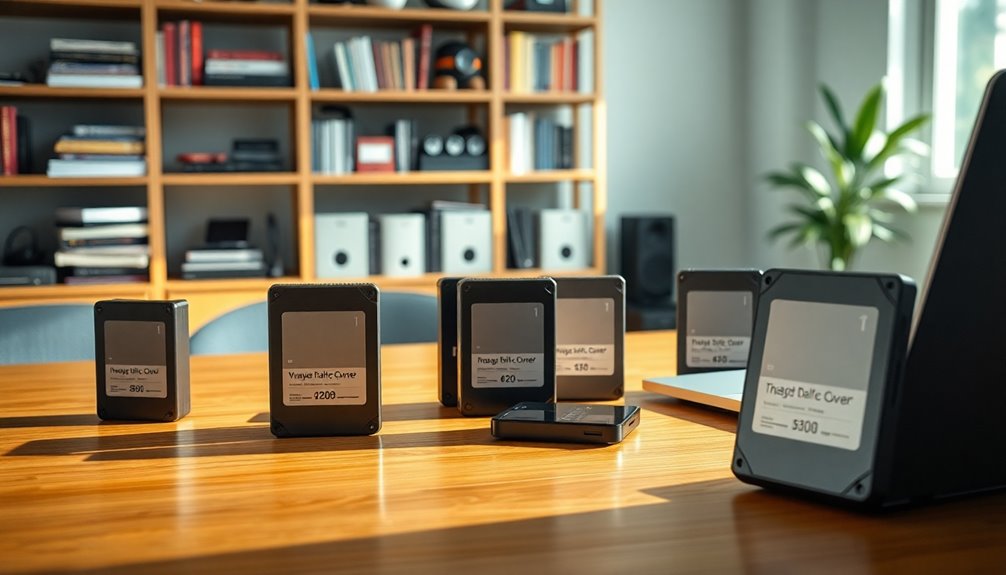When I'm choosing an external hard drive with 2TB or more, I focus on storage capacity, connectivity, and security features. I prefer USB 3.0 for fast data transfer and look for automatic backup options with strong encryption. Portability is key, so I choose compact, durable designs. Don't forget to check the warranty for peace of mind. There's a lot to reflect upon, and I'm here to share more insights that'll help your decision-making process.
Key Takeaways
- Assess your storage needs based on file types, considering 2TB for documents and larger capacities for games or media collections.
- Ensure USB 3.0 connectivity for fast data transfer speeds and check compatibility with your system's file format.
- Look for external drives with automatic backup software and strong security features like 256-bit AES encryption.
- Choose a slim, lightweight design that is durable and portable, making it easy to carry for travel.
- Review user feedback and warranty periods to gauge performance reliability and potential overheating issues.
2TB My Passport Portable External Hard Drive, Black – WDBYVG0020BBK-WESN
If you're looking for a portable solution to back up your important files, the 2TB My Passport Portable External Hard Drive, Black – WDBYVG0020BBK-WESN is an excellent choice. It packs a robust 2TB capacity into a slim design, weighing just 6.4 ounces. This makes it perfect for on-the-go backups. With automatic backup software and password protection, I feel secure knowing my data is safe. Plus, its superspeed USB connectivity guarantees quick transfers. Built for durability, it meets demanding requirements, so I trust it to last. I highly recommend this hard drive for anyone needing reliable and portable file storage.
Best For: Individuals seeking a reliable and portable solution for backing up their important files while on the go.
Pros:
- Automatic backup software allows for customizable scheduling, making backups effortless.
- Built-in password protection with 256-bit AES hardware encryption ensures data security.
- Slim and lightweight design makes it easy to carry anywhere, perfect for travel.
Cons:
- Limited to 2TB capacity, which may not be sufficient for users with extensive data needs.
- Dependence on USB connectivity might be a drawback for users needing alternative connection options.
- Return policy includes conditions that may result in fees for misrepresented returns or damaged items.
Avolusion PRO-X Series USB 3.0 External Hard Drive (16TB, Renewed)
The Avolusion PRO-X Series USB 3.0 External Hard Drive offers a substantial 16TB of storage, making it an excellent choice for anyone needing significant data capacity. This drive's plug-and-play USB 3.0 interface guarantees fast data transfer speeds of up to 5.0 Gbit/s, perfect for backing up large media files or entire systems. I appreciate its silent, fan-less design, which keeps my workspace quiet. Plus, it's compatible with various Windows OS versions, and the included power adapter makes setup a breeze. With a solid two-year warranty, I feel confident in my investment for reliable storage needs.
Best For: Those who require large storage capacity for backups and media files, particularly Windows users.
Pros:
- Plug-and-play USB 3.0 interface provides fast data transfer speeds of up to 5.0 Gbit/s.
- Silent fan-less design ensures quiet operation, ideal for office or home environments.
- Two-year warranty offers peace of mind, reflecting confidence in product reliability.
Cons:
- LED lighting brightness may be distracting for some users.
- Mixed reviews on reliability with previous drives used in enterprise applications.
- Concerns about potential drive failure have been raised by some users.
Factors to Consider When Choosing How to Choose The External Hard Drive: A 2TB+ Buying Guide

When I'm picking an external hard drive with 2TB or more, I focus on a few key factors. I consider my storage needs, the types of connections I'll use, and any backup or security features that might be important. Plus, I can't overlook how portable it is and how well it performs over time.
Storage Capacity Requirements
Determining your storage capacity requirements is essential for selecting the right external hard drive. Start by evaluating the types of files you plan to store; for instance, 2TB works well for documents and photos, while larger files, like games or media collections, may require 16TB or more. If you're frequently running out of space on your devices, it's a sign you need a higher capacity drive. Consider how often you'll transfer data or perform backups, as larger drives simplify management. Future-proofing is also key; opting for more storage now can save you from additional purchases later. Finally, verify you choose a format compatible with your system, like NTFS for Windows, for seamless usage.
Connectivity Options Available
After evaluating your storage capacity requirements, it's time to focus on connectivity options available for your external hard drive. First, I recommend looking for USB 3.0 connectivity, as it offers impressive data transfer speeds of up to 5.0 Gbit/s, making backups and file transfers a breeze compared to USB 2.0. Plug-and-play features are also essential; they guarantee hassle-free use across different operating systems without needing extra software or drivers. Make sure the drive is compatible with your hardware, especially if it's pre-formatted for specific file systems like NTFS. It's beneficial to choose a drive with multiple USB ports for connecting various devices. Finally, consider whether it requires an external power adapter or if it draws power through the USB connection.
Backup and Security Features
Choosing the right external hard drive involves more than just storage capacity; you also need to evaluate backup and security features that keep your data safe. I recommend looking for drives that offer automatic backup software with customizable scheduling to simplify your data management. It's vital to confirm the drive has password protection features, like built-in 256-bit AES hardware encryption, to safeguard sensitive information. Discovery software can also be a great asset, assisting in backup and overall drive management. Consider drives that allow connections to social media and cloud storage for easier file organization. Finally, don't forget to check the warranty and return policy, as reliable backup and security should come with solid guarantees against defects.
Design and Portability Aspects
When you're on the hunt for the perfect external hard drive, design and portability can make all the difference. I always look for slim, lightweight models—ideally around 4.22 x 2.95 x 0.44 inches and weighing about 6.4 ounces. A durable construction is essential, as I need a drive that can withstand travel without damage. It's also nice to pick from vibrant colors that reflect my personal style. I prefer compact drives with a plug-and-play design, making connectivity effortless on the go. Finally, I verify the drive has USB 3.0 or superspeed USB connectivity for fast data transfers while still being compatible with older USB 2.0 ports. This way, I'm covered no matter where I am.
Performance and Reliability Metrics
While portability and design are important, the performance and reliability of an external hard drive can truly make or break your experience. I always look for drives with USB 3.0 interfaces, as they offer impressive data transfer speeds up to 5.0 Gbit/s, markedly outpacing USB 2.0. Reliability is just as essential; I pay attention to user reviews and warranty periods, typically ranging from 1 to 2 years, which show a manufacturer's confidence in their product. Drives made from durable materials tend to last longer and resist physical damage better. Plus, if you're using the drive for daily backups or large file transfers, opt for one optimized for sustained performance. Keep an eye on potential issues like overheating, too!
Warranty and Return Policies
Understanding warranty and return policies is essential, especially since these factors can greatly impact your satisfaction with an external hard drive. When I shop for one, I always check the warranty period—some manufacturers offer up to two years of coverage. A solid return policy is just as important; I prefer options that allow for a full refund within 30 days if the item is defective or doesn't meet my expectations. However, I'm cautious of additional conditions, like restocking fees for damaged items or limitations on returns after a specific period. Ultimately, I make sure to review any vendor-specific policies, as they can differ and might affect my ability to return the product if needed.
Frequently Asked Questions
What Is the Average Lifespan of an External Hard Drive?
The average lifespan of an external hard drive usually ranges from three to five years, depending on usage and care. I've found that proper handling and regular backups can extend that lifespan. If you're using it for heavy data transfers or in high-heat environments, it might wear out faster. I always keep an eye on performance and back up important files regularly to avoid any potential data loss.
Can External Hard Drives Be Used With Gaming Consoles?
You'd think gaming consoles would only want to play nice with their own kind, right? Well, I'm happy to tell you that external hard drives can actually work wonders with them! I've used one with my console, and it's been a game-changer. They let me store tons of games and DLCs without worrying about space. Just make sure to check compatibility, and your gaming experience will level up in no time!
Are SSDS Better Than HDDS for External Storage?
When deciding between SSDs and HDDs for external storage, I've found that SSDs generally offer faster speeds and better durability. They're more compact, which makes them easier to carry around. On the flip side, HDDs provide more storage for less money, which can be tempting for larger files. Ultimately, it depends on what I need—speed for gaming or a budget-friendly option for general storage. I usually lean towards SSDs for their performance.
How Do I Securely Erase Data From My External Hard Drive?
Think of your data like a diary—once it's out there, you want to make sure it's truly gone when you're done with it. To securely erase data from my external hard drive, I use software that wipes it clean, ensuring no trace remains. Programs like DBAN or built-in disk utilities work wonders. I also physically destroy the drive if it holds sensitive info. Always double-check your backups before you start, though!
What Are the Differences Between USB 3.0 and USB 3.1 Connections?
When I compare USB 3.0 and USB 3.1 connections, I notice some key differences. USB 3.1 offers faster data transfer rates, reaching up to 10 Gbps compared to USB 3.0's 5 Gbps. Plus, USB 3.1 is more efficient, allowing for better power management. I also find that USB 3.1 supports a wider range of devices. So, if speed and efficiency matter to you, USB 3.1 is definitely the way to go!
Conclusion
Choosing the right external hard drive can feel overwhelming, but it doesn't have to be. On one hand, you want massive storage, like the Avolusion PRO-X with its 16TB capacity, while on the other, a sleek, portable option like the 2TB My Passport might catch your eye. Ultimately, it's about finding the perfect balance between space and convenience. So, weigh your needs against your lifestyle, and you'll find the drive that fits just right.












